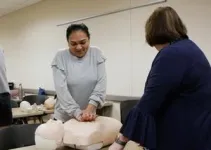(Press-News.org) COLUMBUS, Ohio – If someone collapsed after going into cardiac arrest, would you be prepared to help? For nearly half of Americans, the answer is no.
A new survey from The Ohio State University Wexner Medical Center finds many Americans are ill-prepared to help in emergency situations.
The national poll of 1,005 people found only 51% of Americans feel they would be able to perform hands-only CPR in an emergency. When it comes to serious bleeding, 49% said they could step in to help. And 56% of survey participants said they can stop choking.
“Before emergency responders arrive, it’s up to us as the public to initiate care,” said Nicholas Kman, MD, emergency medicine physician at Ohio State Wexner Medical Center and clinical professor of emergency medicine at The Ohio State University College of Medicine. “For every minute that passes, the chance of survival drops, and if they do survive, there’s less chance of a good neurologic outcome.”
Hands-only CPR
According to the American Heart Association, most people who go into cardiac arrest outside of the hospital are at a home or in a public area. Sixty to 80% of them die before reaching the hospital. Bystander CPR can double or triple survival rates.
“We would love the public to learn how to do hands-only CPR and practice the skill of doing CPR every six weeks,” Kman said. “Like with any skill, practice builds confidence. If we don’t practice it, we lose that skill.”
Stop serious bleeding
Accidents around the home with knives and saws, car crashes and other traumas can cause serious bleeding. STOP THE BLEED® training teaches people to how control bleeding until medical help arrives.
“Initiating hemorrhage control is something that you have to do very quickly,” Kman said. “We know from different studies that a patient with major bleeding can die in two to five minutes depending on the location of the bleed.”
Choking first aid
When food or an object is stuck in a person's throat, it can block their ability to breathe, talk or cough. A choking person isn’t getting oxygen to their lungs, which can lead to brain damage. Performing abdominal thrusts or the Heimlich maneuver can force the item out of the body.
“Somebody who's choking will eventually run out of oxygen, collapse and have a cardiac arrest,” Kman said.
Bystander preparation
Training in hands-only CPR, bleeding control and choking first aid is available in-person and online through many local organizations and employers. Certifications can be renewed every two years.
“We're responsible for each other,” Kman said. “When you’re trained in these lifesaving skills, you’ll know how to recognize the signs that someone needs help and buy time until the responders can get there.”
Survey Methodology
This study was conducted on behalf of The Ohio State University Wexner Medical Center by SSRS on its Opinion Panel Omnibus platform. The SSRS Opinion Panel Omnibus is a national, twice-per-month, probability-based survey. Data collection was conducted from April 5-7, 2024 among a sample of 1,005 respondents. The survey was conducted via web (n=975) and telephone (n=30) and administered in English. The margin of error for total respondents is +/- 3.4 percentage points at the 95% confidence level. All SSRS Opinion Panel Omnibus data are weighted to represent the target population of U.S. adults ages 18 or older.
END
Ohio State survey finds half of Americans feel unprepared to help in a life-threatening emergency
Experts stress that basic first aid skills and the confidence to use them when needed saves lives
2024-05-22
ELSE PRESS RELEASES FROM THIS DATE:
HPV testing for cervical cancer may be safe at longer intervals than what current guidelines recommend
2024-05-22
Bottom Line: The risk of detecting cervical precancer eight years after a negative human papillomavirus (HPV) screening was found to be similar to the risk after three years (the commonly recommended screening interval) after a negative cytology screening.
Journal in Which the Study was Published: Cancer Epidemiology, Biomarkers & Prevention, a journal of the American Association for Cancer Research (AACR)
Authors: Anna Gottschlich, PhD, MPH, assistant professor at Wayne State School of Medicine and the Barbara Ann Karmanos Cancer Institute
Background: ...
Investigating failure mechanisms of solid electrolyte interphase in silicon particles
2024-05-22
Lithium-ion batteries are widely used in new energy vehicles due to their low self-discharge rate and long cycle life. Currently, the anode material of commercial lithium-ion batteries mainly adopts graphite, with a theoretical capacity of only 372 mAh g-1 — which has gradually failed to meet the increasing demand for energy density.
Silicon has been widely studied by virtue of its high theoretical capacity of 4200 mAh g-1. However, silicon produces volume changes of up to 300% during lithiation and delithiation, and the ensuing mechanical degradation and capacity loss hinder applications. To reduce the adverse effects caused by mechanical deformation, silicon structure optimization ...
Legacy of Indigenous stewardship of camas dates back more than 3,500 years, OSU study finds
2024-05-22
An Oregon State University study found evidence that Indigenous groups in the Pacific Northwest were intentionally harvesting edible camas bulbs at optimal stages of the plant’s maturation as far back as 3,500 years ago.
The findings contribute to the growing body of research around Traditional Ecological Knowledge and practices, demonstrating the care and specificity with which Indigenous groups have been stewarding and cultivating natural resources for millennia.
Camas is an ecological and cultural keystone, meaning it is a species that many other organisms depend on and that features prominently within many cultural practices.
“If you think about salmon as being a charismatic ...
Regular fish oil supplement use might boost first time heart disease and stroke risk
2024-05-22
Regular use of fish oil supplements might increase, rather than lessen, the risk of first time heart disease and stroke among those in good cardiovascular health, but may slow progression of existing poor cardiovascular health and lower the risk of death, suggest the results of a large long term study, published in the open access journal BMJ Medicine.
Fish oil is a rich source of omega 3 fatty acids, and as such, is recommended as a dietary preventive to ward off the development of cardiovascular disease. But the evidence on how much protection it affords is inconclusive, explain the researchers.
To strengthen the evidence base, they set out to estimate the associations ...
Some teen girls clocking up close to 6 smartphone hours/day, Finnish study finds
2024-05-22
Some teenage girls are clocking up close to 6 hours a day on their smartphones, with a significant proportion of them likely addicted to social media, finds research published online in the journal Archives of Disease in Childhood.
Social media addiction was associated with poorer health and wellbeing, the findings indicate.
Recent research has linked increasing levels of anxiety among teen girls with social media use, note the researchers. This may involve several factors, one of which is addiction, with estimated international prevalence ranging from 5% to 31%, they add.
Because both anxiety and social media use are more common among girls, the researchers wanted to: measure ...
Pedestrians may be twice as likely to be hit by electric/hybrid cars as petrol/diesel ones
2024-05-22
Pedestrians may be twice as likely to be hit by an electric or hybrid car as those powered by petrol or diesel, finds a study of 2013-17 casualty rates in Great Britain, and published online in the Journal of Epidemiology & Community Health.
The risk is greater in urban areas, and governments must take steps to mitigate this safety hazard as they proceed to phase out fossil fuelled vehicles to improve air quality and curb climate change, urge the researchers.
Road traffic injuries are the leading cause of death for children and young people, and 1 in 4 road traffic deaths are of pedestrians, they note.
Amid ...
Scientists create tailored drug for aggressive breast cancer
2024-05-22
Scientists have used breast cancer cells’ weakness against themselves by linking a tumour-selective antibody with a cell-killing drug to destroy hard-to-treat tumours.
The research, published today in Clinical Cancer Research by a team from King’s College London and funded by Breast Cancer Now, marks a new method in cancer treatment.
The discovery is particular to triple negative breast cancer, which makes up 15% of all diagnosed breast cancer. This type of breast cancer is typically aggressive, resistant to chemotherapy, has a lower survival rate and is more common in women under 40.
Usual treatment involves surgery, chemotherapy ...
Language change harms our ability to communicate and understand
2024-05-22
EMBARGO: WEDNESDAY 22 MAY, 00:01 BST (TUESDAY 21 MAY, 19:01 ET).
Changes to the definitions of conceptual words like ‘woke’ and ‘gaslighting’ are harming our ability to communicate and understand our experiences, a Leeds academic argues.
In a new paper published in The Philosophical Quarterly journal, an ethicist at the University of Leeds has coined a term for the harm caused when language change leaves us lost for words.
Words such as ‘woke’, ‘depression’, ...
Jamestown Colony residents ate dogs with Indigenous ancestry
2024-05-22
Dogs with Indigenous ancestry were eaten during a period of starvation at Jamestown, the first English settlement in North America in the 17th century, according to new research in American Antiquity, published by Cambridge University Press on behalf of the Society for American Archaeology.
This discovery changes historians’ understanding of how Indigenous communities negotiated their relationship with rising colonial powers during this period. It also suggests that early European colonists depended on local Indigenous communities for their very survival, especially during the initial settlement period.
Researchers analysed ancient mitochondrial DNA from archaeological dogs from Jamestown ...
Australian study proves ‘humans are planet’s most frightening predator’
2024-05-22
Australia lacks fearsome large carnivores like lions and wolves, and the relative lack of fear that marsupials like kangaroos and wallabies show to dogs (and other introduced carnivores) has been attributed to a lack of evolutionary experience with large mammalian predators. This, however, overlooks the 50,000-year-long presence in Australia of the world’s most fearsome predator – the human ‘super predator.’
A new study conducted by Western University biology professor Liana Zanette, in collaboration with Calum ...
LAST 30 PRESS RELEASES:
How sleep disruption impairs social memory: Oxytocin circuits reveal mechanisms and therapeutic opportunities
Natural compound from pomegranate leaves disrupts disease-causing amyloid
A depression treatment that once took eight weeks may work just as well in one
New study calls for personalized, tiered approach to postpartum care
The hidden breath of cities: Why we need to look closer at public fountains
Rewetting peatlands could unlock more effective carbon removal using biochar
Microplastics discovered in prostate tumors
ACES marks 150 years of the Morrow Plots, our nation's oldest research field
Physicists open door to future, hyper-efficient ‘orbitronic’ devices
$80 million supports research into exceptional longevity
Why the planet doesn’t dry out together: scientists solve a global climate puzzle
Global greening: The Earth’s green wave is shifting
You don't need to be very altruistic to stop an epidemic
Signs on Stone Age objects: Precursor to written language dates back 40,000 years
MIT study reveals climatic fingerprints of wildfires and volcanic eruptions
A shift from the sandlot to the travel team for youth sports
Hair-width LEDs could replace lasers
The hidden infections that refuse to go away: how household practices can stop deadly diseases
Ochsner MD Anderson uses groundbreaking TIL therapy to treat advanced melanoma in adults
A heatshield for ‘never-wet’ surfaces: Rice engineering team repels even near-boiling water with low-cost, scalable coating
Skills from being a birder may change—and benefit—your brain
Waterloo researchers turning plastic waste into vinegar
Measuring the expansion of the universe with cosmic fireworks
How horses whinny: Whistling while singing
US newborn hepatitis B virus vaccination rates
When influencers raise a glass, young viewers want to join them
Exposure to alcohol-related social media content and desire to drink among young adults
Access to dialysis facilities in socioeconomically advantaged and disadvantaged communities
Dietary patterns and indicators of cognitive function
New study shows dry powder inhalers can improve patient outcomes and lower environmental impact
[Press-News.org] Ohio State survey finds half of Americans feel unprepared to help in a life-threatening emergencyExperts stress that basic first aid skills and the confidence to use them when needed saves lives




